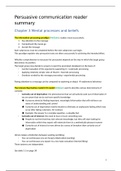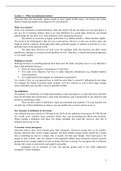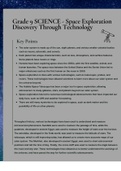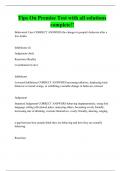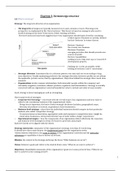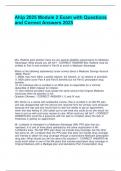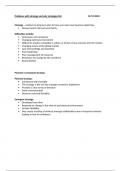Week 1
Accoun ng is a MEMORY-aid Allows humans to create and store transac onal records
outside their brains for a long me
Analy cs part How to use what we store in memory
“In the informa on society, which is based on innova on, knowledge, and services, the key
determinant of success has shi ed from product quality to decision quality.” = world is changing
Decision quality is dependent on informa on quality accoun ng is all about informa on quality
Discipline and rou ne is fundamental for crea vity
‘[Crea ve people] think like ar sts but work like accountants’.
Accountants are gatekeepers of rou nes
Accountants add value by:
Really understanding the business they have to translate into accoun ng language
Providing reliable informa on they need to understand business processes
= compe ve advantage
How to strengthen this compe ve advantage:
Understanding process diagrams
Help visualizing and understanding how a business func ons
Simplified diagrams allows us to focus on the essence of the process
Collec ng, storing, processing/analysing, and communica on accoun ng data and
informa on
Individual memory systems:
Agenda, to do lists, address book on phone
Similari es to all data management systems:
Storage medium
Structure
Interface is organized for rapid data
entry and retrieval
Selec on of DMS requires a trade-off
decision
Informa on systems:
TPS - Transac on processing systems: collect and store data from business transac ons
MIS - Management informa on systems: convert data from a TPS into informa on for
planning, controlling, and managing an organiza on
DSS - Decision support systems: Support managerial decision making by providing models for
processing and analysing data
BI - Business intelligence: gather, store, and analyse data to improve decision making
OLAP - Online analy cal processing: provide a mul dimensional view of data
DM - Data mining: use of sta s cal analysis and ar ficial intelligence techniques to iden fy
hidden rela onships in data
ML - Machine learning: using so ware to make decisions or recommenda ons tradi onally
made by humans.
1
, Informa on system:
Collect data store data process data communicate info
(ERP system web ERP system database analysis summary dashboards)
TPS DSS BI-DM ML
Desired a ributes of data:
Shareable: readily accessed by more than one person at a me
Transportable: easily moved to a decision maker
Secure: protected from destruc on and unauthorized use
Accurate: reliable, precise records
Timely: current and up-to-date
Relevant: appropriate to the decision
Components of organiza onal memory:
People: major component of an organiza on’s memory because they know how to use many
of the other components
Each person: Role and posi on
Culture: shared beliefs, values, a tudes, and norms that influence behaviour
Conversa ons and discussions create a social network
Metamemory: people’s recall of how to use organiza onal memory = core component
Text:
Table: general form that describes a variety of other structures used to store data
o Data in one column are of the same type: each cell of one row “price”
contains a number
o Data are limited by the width of the available space
Document: common medium for storing organiza onal data
o lack the regularity and discipline of a table
o Hypertext, the familiar linking technology of the Web, supports nonlinear
document processing
Mul media:
Image: visual data: photographs and sketches. Used for:
o Iden fica on and security (police)
o Evidence (insurance)
o Adver sing and promo onal campaigns
o Selling images and maintain extensive libraries of clip art and photographs
Graphics: contains explicitly embedded data (e.g. maps or engineering drawings)
Audio
Video
Model: build mathema cal models to describe their business to analyse exis ng problems
and forecast future business condi ons
Knowledge: organiza ons build systems to capture the knowledge of their experienced
decision makers and problem solvers
Problems with organiza onal DMS:
Redundancy: same data are stored in different systems
Lack of data control: data are poorly managed
Poor interface: data are difficult to access
Delays: there are frequently delays following requests for reports
Lack of reality: data management systems do not reflect the complexity of the real world
Lack of data integra on: data are dispersed across different systems
2
Accoun ng is a MEMORY-aid Allows humans to create and store transac onal records
outside their brains for a long me
Analy cs part How to use what we store in memory
“In the informa on society, which is based on innova on, knowledge, and services, the key
determinant of success has shi ed from product quality to decision quality.” = world is changing
Decision quality is dependent on informa on quality accoun ng is all about informa on quality
Discipline and rou ne is fundamental for crea vity
‘[Crea ve people] think like ar sts but work like accountants’.
Accountants are gatekeepers of rou nes
Accountants add value by:
Really understanding the business they have to translate into accoun ng language
Providing reliable informa on they need to understand business processes
= compe ve advantage
How to strengthen this compe ve advantage:
Understanding process diagrams
Help visualizing and understanding how a business func ons
Simplified diagrams allows us to focus on the essence of the process
Collec ng, storing, processing/analysing, and communica on accoun ng data and
informa on
Individual memory systems:
Agenda, to do lists, address book on phone
Similari es to all data management systems:
Storage medium
Structure
Interface is organized for rapid data
entry and retrieval
Selec on of DMS requires a trade-off
decision
Informa on systems:
TPS - Transac on processing systems: collect and store data from business transac ons
MIS - Management informa on systems: convert data from a TPS into informa on for
planning, controlling, and managing an organiza on
DSS - Decision support systems: Support managerial decision making by providing models for
processing and analysing data
BI - Business intelligence: gather, store, and analyse data to improve decision making
OLAP - Online analy cal processing: provide a mul dimensional view of data
DM - Data mining: use of sta s cal analysis and ar ficial intelligence techniques to iden fy
hidden rela onships in data
ML - Machine learning: using so ware to make decisions or recommenda ons tradi onally
made by humans.
1
, Informa on system:
Collect data store data process data communicate info
(ERP system web ERP system database analysis summary dashboards)
TPS DSS BI-DM ML
Desired a ributes of data:
Shareable: readily accessed by more than one person at a me
Transportable: easily moved to a decision maker
Secure: protected from destruc on and unauthorized use
Accurate: reliable, precise records
Timely: current and up-to-date
Relevant: appropriate to the decision
Components of organiza onal memory:
People: major component of an organiza on’s memory because they know how to use many
of the other components
Each person: Role and posi on
Culture: shared beliefs, values, a tudes, and norms that influence behaviour
Conversa ons and discussions create a social network
Metamemory: people’s recall of how to use organiza onal memory = core component
Text:
Table: general form that describes a variety of other structures used to store data
o Data in one column are of the same type: each cell of one row “price”
contains a number
o Data are limited by the width of the available space
Document: common medium for storing organiza onal data
o lack the regularity and discipline of a table
o Hypertext, the familiar linking technology of the Web, supports nonlinear
document processing
Mul media:
Image: visual data: photographs and sketches. Used for:
o Iden fica on and security (police)
o Evidence (insurance)
o Adver sing and promo onal campaigns
o Selling images and maintain extensive libraries of clip art and photographs
Graphics: contains explicitly embedded data (e.g. maps or engineering drawings)
Audio
Video
Model: build mathema cal models to describe their business to analyse exis ng problems
and forecast future business condi ons
Knowledge: organiza ons build systems to capture the knowledge of their experienced
decision makers and problem solvers
Problems with organiza onal DMS:
Redundancy: same data are stored in different systems
Lack of data control: data are poorly managed
Poor interface: data are difficult to access
Delays: there are frequently delays following requests for reports
Lack of reality: data management systems do not reflect the complexity of the real world
Lack of data integra on: data are dispersed across different systems
2


